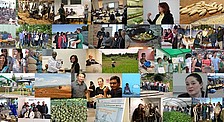FSC-UC Summer School 2016 “Climate Change: Impacts on Food Security”
25th July -11th August 2016, Kasetsart University, Bangkok, Thailand
The FSC-UC Summer School 2016 was organized jointly by the Food Security Center (FSC) of the University of Hohenheim, the Southeast Asian University Consortium for Graduate Education in Agriculture and Natural Resources (UC), the Southeast Asian Regional Center for Graduate Study and Research in Agriculture (SEARCA) and Kasetsart University (KU). The topic of this course, “Climate Change: Impacts on Food Security”, was chosen not only to reflect the common interest among organizing parties but also to be consistent with global message of FAO for World Food Day 2016 as “Climate is changing. Food and Agriculture must too”.
Venue and Dates
The course was held at Faculty of Agriculture and Faculty of Fisheries, Kasetsart University, Thailand during July 25th – August 11th, 2016.
Participants
The total of 29 participants from 16 developing countries in Asia, Africa and Latin America have joined in the program. Twelve students (4 from each region) were sponsored by FSC while 10 students (2 from each member institute) were supported by UC and 6 others were funded by SEARCA. One additional exchange graduate student from University of Hohenheim also attended this course. Participants were from Philippines, Malaysia, Indonesia, Myanmar, Cambodia, Lao PDR, Pakistan, Sri Lanka, Thailand, Kenya, Ghana, Cameroon, Argentina, Costa Rica, El Salvador, and Colombia with diverse backgrounds of study.
Course Content
The summer school consisted of 3 one-week modules:
- Module 1 (July 25-29, 2016): Climate change and fisheries/aquaculture by Dr. Sukrit Nimitkul, Department of Aquaculture, Faculty of Fisheries at Kasetsart University Thailand
- Module 2 (August 1-5, 2016): Climate change and livestock production by Dr. Jean Rust, Döhne Agricultural Development Institute, South Africa
- Module 3 (August 8-11, 2016): Climate smart agriculture by Dr. David Reiser University of Hohenheim, Germany
Each module was a mixture of lecture/theory, case studies, group discussion and excursions.
Outputs
The students were enrolled in a course 01013596 (Selected topic in Tropical Agriculture: Climate Change: Impacts on Food Security) as exchange students at Kasetsart University and passed the course with satisfactory results.
In the first week, they were briefed on the impacts of climate change on aquaculture and fisheries industry. Though the focus was mainly on Thailand and some parts of Southeast Asia, they have learned strategies which could be adopted in their own countries. One important highlight was the field trip that offered an insight as to how the ordinary Thai farmer understands and copes with climate change.
The second week highlighted the impact of climate change on livestock with specific focus on Africa. Participants were enlightened about various livestock systems and how each of them may mitigate or adapt to the effects of climate change. They partook in group assignments on different case studies that enabled them to learn how people of different countries adapt to changes.
During the third week, students were introduced to climate smart agriculture and precision agriculture. Although the content was technical, technology is one of the options by which they can solve many problems concerning food security especially in the developing world.
Outcomes
This international summer school has promoted good recognition of FSC, UC, SEARCA and KU as academic leaders with focus on global issue of climate change and food security. The linkages and collaborations among all parties were tightened and will be the good example for future collaborative activities.
In addition to technical information and knowledge received, participants also experienced Thai culture and cultures from various parts of the world. They were exposed to how people do things differently and how to accept these things. They had opportunities for horizontal exchange of experience and networking with other professionals from different nationalities. Social media were used as means for networking among these young scholars. Evidences have shown that the networking will enable them to stay connected as friends and also provide a platform for future collaboration and mutual assistance in resolving problem of the region and of the world.

